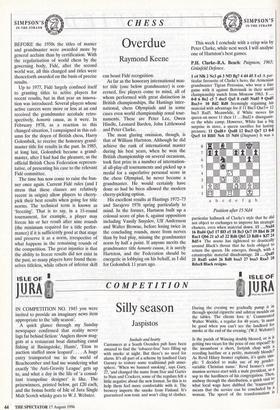SIMPSON'S
IN•TUE•STRANI)
SIMPSON'S
IN•THE•STRAND
CHESS
Overdue
Raymond Keene
BEFORE the 1950s the titles of master and grandmaster were awarded more by general acclaim than by certification. With the regularisation of world chess by the governing body, Fide, after the second world war, all this changed and titles were thenceforth awarded on the basis of precise results.
Up to 1977, Fide largely confined itself to granting titles to active players for recent results, but in that year an innova- tion was introduced. Several players whose active careers were more or less at an end received the grandmaster accolade retro- spectively, honods causa, as it were. In February 1978, as a reaction to this changed situation, I campaigned in this col- umn for the doyen of British chess, Harry Golombek, to receive the honorary grand- master title for results in the past. In 1985, at long last, Golombek became a grand- master, after I had had the pleasure, as the official British Chess Federation represen- tative, of presenting his case to the relevant Fide committee.
The time has now come to raise the ban- ner once again. Current Fide rules (and I stress that these clauses are relatively recent in origin) allow players to cherry- pick their best results when going for title norms. The technical term is known as 'freezing'. That is to say, in a 15-round tournament, for example, a player may freeze his or her result after nine rounds (the minimum required for a title perfor- mance) if it is sufficiently good at that stage and preserve it as a norm, irrespective of what happens in the remaining rounds of the competition. The great injustice is that the ability to freeze results did not exist in the past, so many players have found them- selves titleless, while others of inferior skill can boast Fide recognition.
As far as the honorary international mas- ter title (one below grandmaster) is con- cerned, five players come to mind, all of whom performed with great distinction in British championships, the Hastings inter- national, chess Olympiads and in some cases even world championship zonal tour- naments. These are Peter Lee, Owen Hindle, Leonard Barden, John Littlewood and Peter Clarke.
The most glaring omission, though, is that of William Hartston. Although he did achieve the rank of international master during his best years, when he won the British championship on several occasions, took first prize in a number of internation- al all-play-all tournaments and picked up a medal for a superlative personal score in the chess Olympiad, he never became a grandmaster. He would certainly have done so had he been allowed the modern cherry-picking option.
His excellent results at Hastings 1972-73 and Sarajevo 1976 spring particularly to mind. In the former, Hartston built up a colossal score of plus 6, against opposition including Vassily Smyslov, Ulf Andersson and Walter Browne, before losing twice in the concluding rounds, more from nerves than by bad play, missing the grandmaster norm by half a point. If anyone merits the grandmaster title honoris causa, it is surely Hartston, and the Federation should be energetic in lobbying on his behalf, as I did for Golombek 11 years ago. This week I conclude with a crisp win by Peter Clarke, while next week I will analyse one of Hartston's best games.
P.H. Clarke—R.A. Beach: Paignton, 1965; Grunfeld Defence.
1 c4 Nf6 2 Nc3 g6 3 NO Bg7 4 d4 d5 5 e3 A par- ticular favourite of Clarke's hero, the Armenian grandmaster Tigran Petrosian, who won a fine game with it against Botvinnik in their world championship match from Moscow 1963. 5 ..• 0-0 6 Be2 c5 7 dxc5 Qa5 8 cxx15 Nxd5 9 Qxd5 Bxc3+ 10 Bd2 Rd8 Seemingly regaining his material with advantage for if 11 Bxc3 Qxe3+ 12 bxc3 Rxd5. Meanwhile, if White moves his queen on move 11 then 11 ...I3xd2+ disorganis- es the white camp. However, White has a big surprise in store, a queen sacrifice for lasting pressure. 11 QxdS+ QxdS 12 Bac3 Qc7 13 0..0 QxcS 14 Rfdl Nc6 15 Nd4 (Diagram) It was a particular hallmark of Clarke's style that he did not object to exchanges to improve his strategic chances, even when material down. 15 ...Nada 16 Bxd4 Qa5 17 1113 e5 18 Bc3 Qc7 19 Bb4 f6 20 Racl Qb6 21 a3 n5 22 Rd6 Qb5 23 Rd8+ 107 24 Bd5+ The noose has tightened so drastically around Black's throat that he feels obliged 19 return the queen. lie emerges, though, with a catastrophic material disadvantage. 24 ...Qx05 25 Rxd5 axb4 26 Rd8 bxa3 27 bxa3 Rxa3 28 Rdxc8 Black resigns.


















































 Previous page
Previous page